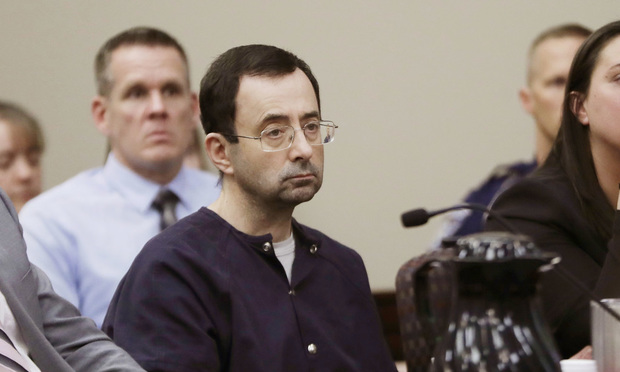Opinion: MSU Faces Legal Risk as Culpability Questions Are Raised in the Nassar Scandal
MSU is in the public eye as the survivors of Nassar's abuse are beginning to question why the school refused to act after many of them came forward to report his misconduct.
February 22, 2018 at 02:40 PM
5 minute read

Anyone who watched the sentencing of disgraced doctor, Larry Nassar, had to be impacted by the enormity of his wrongdoing and how it remained hidden for so long. But recent facts that have come to light reveal that Michigan State University had an opportunity to get ahead of the abuse when the allegations surfaced, but it did not.
According to the Lansing State Journal, MSU failed to conduct a full-blown independent investigation at the onset, when according to news reports it instead relied on internal personnel to head the probe. Later, according to the Detroit News, when the school finally secured outside counsel for assistance, it mislead the public to believe it was done as part of an independent investigation. Now MSU will have to face the consequences of its apparent inaction. In addition to an increasingly tarnished reputation in the court of public opinion, it faces a full investigation by Michigan's Attorney General Bill Schuette, who has indicated that he'll spare no expense to find out who knew what and when. Consequences may be enormous for the school.
During the sentencing hearing on seven counts of first degree sexual assault, dozens of survivors gave deeply personal testimony about their abuse and its impact on their lives. By the time of his 40- to 175-year prison sentence, more than 250 women who had been under his care over a 20-year period came forward to publicly confront him.
While the MSU Board of Trustees has voiced support for Schuette's investigation, many of the victims are now asking why the institution, which they say enabled Nassar, should not also be held accountable. Why did MSU refuse to act after many of them came forward with details of abuse?
Details of Abuse
Specifically, two important details were made public that complicate the situation. In a 2014 Title IX complaint filed against MSU, former student Amanda Thomashow described Nassar massaging her breasts and genitals under the guise of treatment. The investigation was handled internally at the school by its Title IX Coordinator and concluded that Nassar's behavior was “not of a sexual nature,” a determination based on interviews with three medical specialists and an athletic trainer. All four had personal ties to Nassar, and all four were employed by Michigan State, according to the Lansing State Journal.
It now turns out that the report given to Thomashow was different than the internal report given to, and only recently made public by, MSU. That report also cleared Nassar of harassment but included the assessment that his methods were inflicting “unnecessary trauma” on his patients and were putting the university at risk. Thomashow never saw it.
Attorneys representing Nassar's victims were shocked to hear of two reports, noting that if the internal MSU Report was made public in 2014, MSU could have prevented further abuse. “They deprived Amanda and all of the survivors from that knowledge they held at the time. Had they disclosed that information, it would have been disseminated so people would know that Nassar was preying on girls,” explained one of the lawyers.
In 2017, as complaints of abuse were mounting, MSU hired Patrick Fitzgerald, a highly respected former federal prosecutor, to investigate. Fitzgerald was transparent in describing what he and his law firm were engaged to do.
“We were engaged to provide counsel regarding anticipated litigation and to make sure that any internal reviews did not interfere with the two law enforcement inquiries underway,” Fitzgerald wrote, referring to criminal investigations that led to Nassar's prosecution. However, at least one Michigan lawmaker, as well as The Detroit News, have been openly critical of what they view as less than candid conduct on the part of MSU.
“Michigan State led the public to believe that there had been an independent investigation,” said Tom Leonard, the Republican speaker of the Michigan House of Representatives in a recent interview to the New York Times. “And then as we continued to dig into this, we found out it was not an independent investigation. It was an internal investigation to shield them from liability.”
Against this back-drop, is there any doubt why Michigan AG Schuette is so interested in a full- fledged investigation into the conduct of MSU? A letter demanding texts, emails and other records of those who worked closely with Nassar was presented to the MSU Board. It sought immediate production of certain information, with the remainder to be produced by a February 9 deadline. As of this writing, 45,000 documents were timely produced, according to MSU's interim president John Engler who was proud of the board's “prompt compliance” with the request .
For the 150 or so plaintiffs who have already filed lawsuits against the university, release of that information cannot come soon enough. But for MSU, which appears to have compounded its woes with a lack of transparency, the full extent of its troubles may have only begun.
Whatever the results of that investigation may yield, the information will assuredly be used to develop and determine MSU's liability, should its contents support such a finding. Unfortunately for MSU, this is information it had the opportunity to learn about, and learn from, long ago.
Karen Y. Bitar is a partner in the Litigation Department of Seyfarth Shaw LLP, and is national co-chair of the firm's white collar, internal investigations and false claims team. She is based in New York.
This content has been archived. It is available through our partners, LexisNexis® and Bloomberg Law.
To view this content, please continue to their sites.
Not a Lexis Subscriber?
Subscribe Now
Not a Bloomberg Law Subscriber?
Subscribe Now
NOT FOR REPRINT
© 2025 ALM Global, LLC, All Rights Reserved. Request academic re-use from www.copyright.com. All other uses, submit a request to [email protected]. For more information visit Asset & Logo Licensing.
You Might Like
View All
New York Mayor Adams Attacks Fed Prosecutor's Independence, Appeals to Trump
5 minute read

The Marble Palace Blog: Supreme Court Books You Should Read in 2025
Trending Stories
- 1We the People?
- 2New York-Based Skadden Team Joins White & Case Group in Mexico City for Citigroup Demerger
- 3No Two Wildfires Alike: Lawyers Take Different Legal Strategies in California
- 4Poop-Themed Dog Toy OK as Parody, but Still Tarnished Jack Daniel’s Brand, Court Says
- 5Meet the New President of NY's Association of Trial Court Jurists
Who Got The Work
J. Brugh Lower of Gibbons has entered an appearance for industrial equipment supplier Devco Corporation in a pending trademark infringement lawsuit. The suit, accusing the defendant of selling knock-off Graco products, was filed Dec. 18 in New Jersey District Court by Rivkin Radler on behalf of Graco Inc. and Graco Minnesota. The case, assigned to U.S. District Judge Zahid N. Quraishi, is 3:24-cv-11294, Graco Inc. et al v. Devco Corporation.
Who Got The Work
Rebecca Maller-Stein and Kent A. Yalowitz of Arnold & Porter Kaye Scholer have entered their appearances for Hanaco Venture Capital and its executives, Lior Prosor and David Frankel, in a pending securities lawsuit. The action, filed on Dec. 24 in New York Southern District Court by Zell, Aron & Co. on behalf of Goldeneye Advisors, accuses the defendants of negligently and fraudulently managing the plaintiff's $1 million investment. The case, assigned to U.S. District Judge Vernon S. Broderick, is 1:24-cv-09918, Goldeneye Advisors, LLC v. Hanaco Venture Capital, Ltd. et al.
Who Got The Work
Attorneys from A&O Shearman has stepped in as defense counsel for Toronto-Dominion Bank and other defendants in a pending securities class action. The suit, filed Dec. 11 in New York Southern District Court by Bleichmar Fonti & Auld, accuses the defendants of concealing the bank's 'pervasive' deficiencies in regards to its compliance with the Bank Secrecy Act and the quality of its anti-money laundering controls. The case, assigned to U.S. District Judge Arun Subramanian, is 1:24-cv-09445, Gonzalez v. The Toronto-Dominion Bank et al.
Who Got The Work
Crown Castle International, a Pennsylvania company providing shared communications infrastructure, has turned to Luke D. Wolf of Gordon Rees Scully Mansukhani to fend off a pending breach-of-contract lawsuit. The court action, filed Nov. 25 in Michigan Eastern District Court by Hooper Hathaway PC on behalf of The Town Residences LLC, accuses Crown Castle of failing to transfer approximately $30,000 in utility payments from T-Mobile in breach of a roof-top lease and assignment agreement. The case, assigned to U.S. District Judge Susan K. Declercq, is 2:24-cv-13131, The Town Residences LLC v. T-Mobile US, Inc. et al.
Who Got The Work
Wilfred P. Coronato and Daniel M. Schwartz of McCarter & English have stepped in as defense counsel to Electrolux Home Products Inc. in a pending product liability lawsuit. The court action, filed Nov. 26 in New York Eastern District Court by Poulos Lopiccolo PC and Nagel Rice LLP on behalf of David Stern, alleges that the defendant's refrigerators’ drawers and shelving repeatedly break and fall apart within months after purchase. The case, assigned to U.S. District Judge Joan M. Azrack, is 2:24-cv-08204, Stern v. Electrolux Home Products, Inc.
Featured Firms
Law Offices of Gary Martin Hays & Associates, P.C.
(470) 294-1674
Law Offices of Mark E. Salomone
(857) 444-6468
Smith & Hassler
(713) 739-1250









